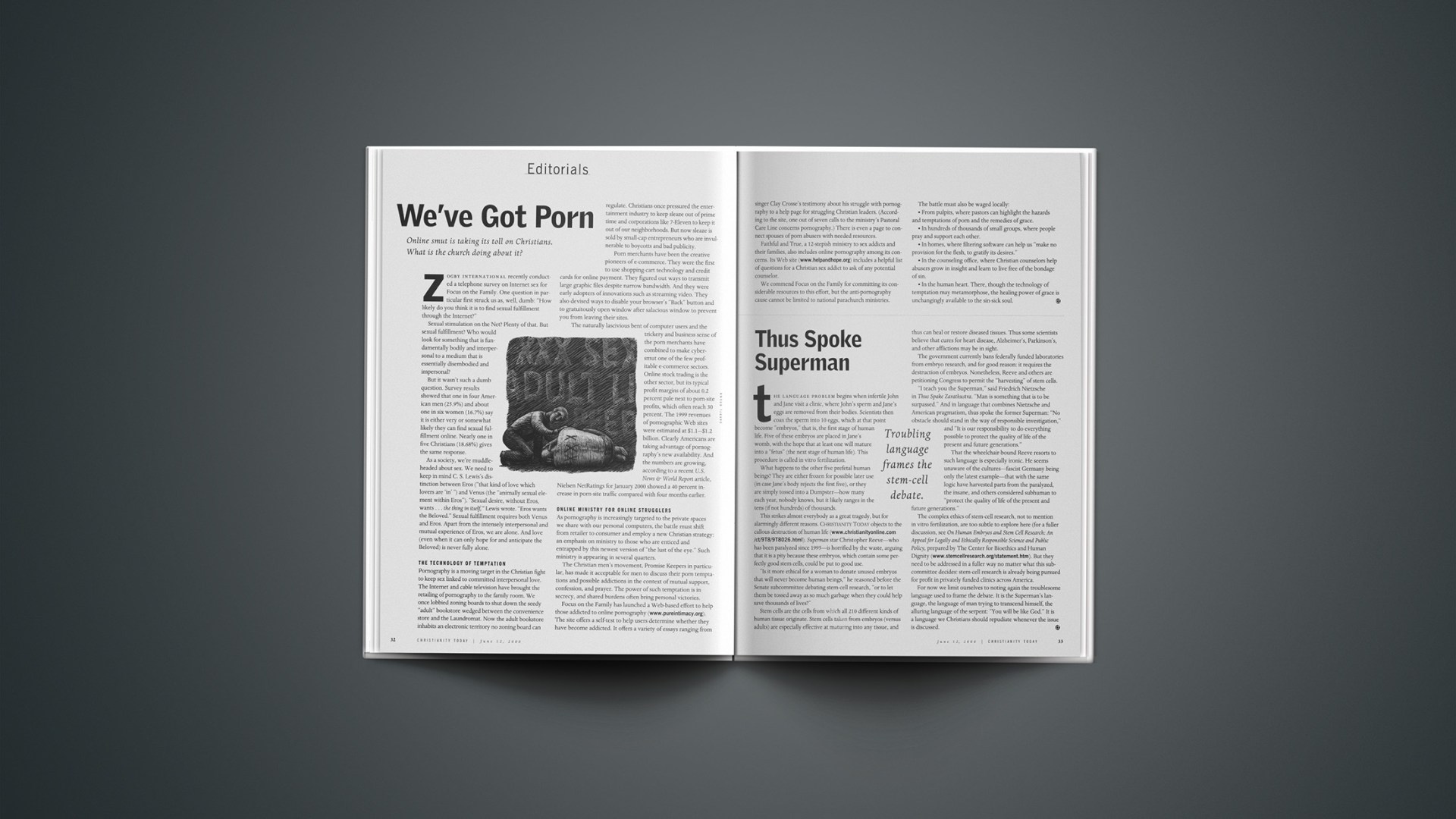The language problem begins when infertile John and Jane visit a clinic, where John’s sperm and Jane’s eggs are removed from their bodies. Scientists then coax the sperm into 10 eggs, which at that point become “embryos,” that is, the first stage of human life. Five of these embryos are placed in Jane’s womb, with the hope that at least one will mature into a “fetus” (the next stage of human life). This procedure is called in vitro fertilization. What happens to the other five prefetal human beings? They are either frozen for possible later use (in case Jane’s body rejects the first five), or they are simply tossed into a Dumpster—how many each year, nobody knows, but it likely ranges in the tens (if not hundreds) of thousands. This strikes almost everybody as a great tragedy, but for alarmingly different reasons. Christianity Today objects to the callous destruction of human life. Superman star Christopher Reeve—who has been paralyzed since 1995—is horrified by the waste, arguing that it is a pity because these embryos, which contain some perfectly good stem cells, could be put to good use.
“Is it more ethical for a woman to donate unused embryos that will never become human beings,” he reasoned before the Senate subcommittee debating stem-cell research, “or to let them be tossed away as so much garbage when they could help save thousands of lives?”
Stem cells are the cells from which all 210 different kinds of human tissue originate. Stem cells taken from embryos (versus adults) are especially effective at maturing into any tissue, and thus can heal or restore diseased tissues. Thus some scientists believe that cures for heart disease, Alzheimer’s, Parkinson’s, and other afflictions may be in sight.The government currently bans federally funded laboratories from embryo research, and for good reason: it requires the destruction of embryos. Nonetheless, Reeve and others are petitioning Congress to permit the “harvesting” of stem cells.
“I teach you the Superman,” said Friedrich Nietzsche in Thus Spake Zarathustra. “Man is something that is to be surpassed.” And in language that combines Nietzsche and American pragmatism, thus spoke the former Superman: “No obstacle should stand in the way of responsible investigation,” and “It is our responsibility to do everything possible to protect the quality of life of the present and future generations.”
That the wheelchair-bound Reeve resorts to such language is especially ironic. He seems unaware of the cultures—fascist Germany being only the latest example—that with the same logic have harvested parts from the paralyzed, the insane, and others considered subhuman to
“protect the quality of life of the present and future generations.”
The complex ethics of stem-cell research, not to mention in vitro fertilization, are too subtle to explore here (for a fuller discussion, see On Human Embryos and Stem Cell Research: An Appeal for Legally and Ethically Responsible Science and Public Policy, prepared by The Center for Bioethics and Human Dignity (www.stemcellresearch.org/statement.htm). But they need to be addressed in a fuller way no matter what this subcommittee decides: stem-cell research is already being pursued for profit in privately funded clinics across America.For now we limit ourselves to noting again the troublesome language used to frame the debate. It is the Superman’s language, the language of man trying to transcend himself, the alluring language of the serpent:
“You will be like God.”
It is a language we Christians should repudiate whenever the issue is discussed.
Related Elsewhere
Various opinions on human stem cell research can be found at Lutherans for Life, the Juvenile Diabetes Foundation, Focus on the Family, Discover, National Review, Technology Review, the Foundation for Biomedical Research, the Coalition of Americans for Research Ethics, and the Federation of American Societies for Experimental Biology.The National Institutes of Health Web site offers an area on stem-cell research that includes the controversial research guidelines and a primer on “what stem cells are; what pluripotent stem cells are; how pluripotent stem cells are derived; why pluripotent stem cells are important to science; why they hold such great promise for advances in health care; and what adult stem cells are.” The American Association for the Advancement of Science has also addressed the issue of human stem cell research.The Web site for Trinity’s Center for Bioethics and Human Dignity includes several areas on stem-cell research and a daily bioethics Weblog. Last year, The New York Times looked at the religious aspects of the debate over human stem cell research. Christopher Reeve discussed the possible benefits of stem cells for spinal cord injuries on Good Morning America. The Christopher Reeve Paralysis Foundation is also online.See our past coverage of this issue:New Stem-Cell Research Guidelines Criticized | NIH guidelines skirt ethical issues about embryo destruction, charge bioethicists (Feb. 7, 2000) Human Embryo Research Resisted (August 9, 1999) Embryo Research Contested (May 24, 1999) Editorial: The Biotech Temptation | Research on human embryos holds great promise, but at what price? (July 12, 1999)
Copyright © 2000 Christianity Today. Click for reprint information.










